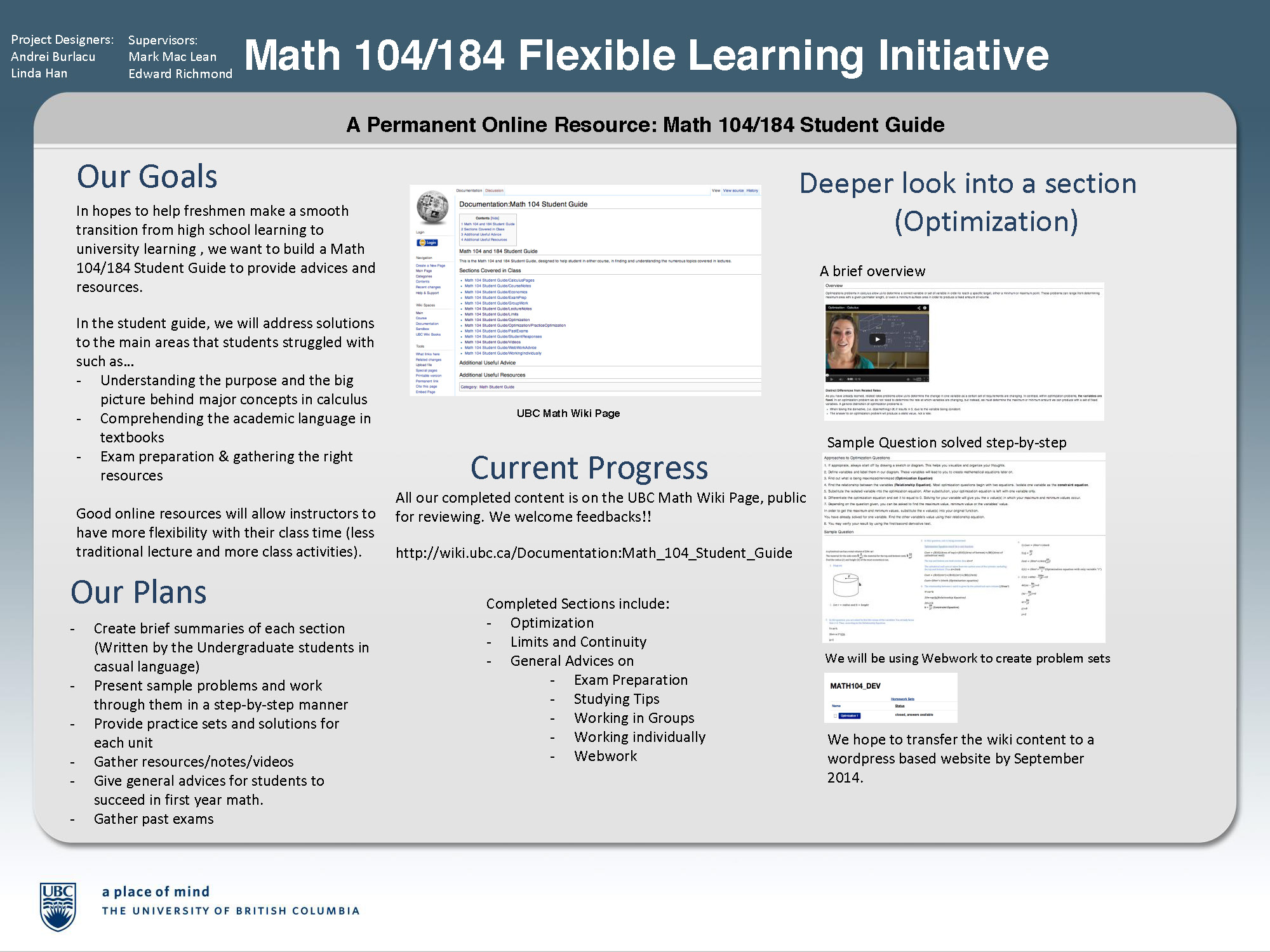| Title | Flipped Classroom Components for Math 104 and Math 184 |
|---|---|
| Faculty/College/Unit | Science |
| Status | Completed |
| Duration | 1 Year |
| Initiation | 07/01/2013 |
| Completion | 08/31/2016 |
| Project Summary | *Special Call: Flexible Learning Projects* This project integrated flipped classroom components in two courses, Differential Calculus with Applications to Commerce and Social Sciences (Math 104 and 184) so that students could spend more time in class doing mathematics rather than observing mathematics being done. The instructors developed resources for increasing students’ in-class engagement in order to improve their conceptual understanding of calculus. At the same time, the instructors designed opportunities for students to master computational skills and receive timely feedback on their work outside of class time through virtual office hours. A small-scale pilot in MATH 104 was delivered in September 2013 and the full course roll-out for MATH 104 and 184 occurred in September 2014. |
| Funding Details | |
| Year 1: Project Year | Year 1 |
| Year 1: Funding Year | 2013/2014 |
| Year 1: Project Type | Large TLEF |
| Year 1: Principal Investigator | Mark MacLean |
| Year 1: Funded Amount | 98,017 |
| Year 1: Team Members | Mark MacLean, Instructor, Mathematics, Faculty of Science |
| Year 1: TLEF Showcase |  |
| Project Report | Report-2013-FL-MacLean-WEB.pdf |
| Project Outcomes | Products & achievements: Student Guide for Math 104/184; Instructor Guide for Math 104/184; Classroom activities, including clickers questions, and related items for posting on the web for outside of class (http://blogs.ubc.ca/mathstudentguide104/ and http://www.math.ubc.ca/~cwsei/math104.html). Intended outcomes/themes:
Evaluation approach: The scheduling issues for team members in this project significantly hampered evaluation efforts. As things did not advance enough during the Teaching & Learning Fellow’s time with the project (the first year), data collection was limited: some student attitude data was collected, but there nothing clear to compare it with in a subsequent year; focus groups received too many cancellations and were not feasible at later dates. As a result, evaluation so far has been limited.
Findings: Overall lessons were learned; work undertaken in this project re-emphasized the importance of resources for students and instructors (especially novice instructors) and provided some ideas around what could be effective for such support. Student Guide: The guide was not updated during the 2015W offering of the course. The level of student usage is not clear. Instructor Guide: While the content is available in PDFs, the annotation software is clunky and significant uptake/use of this feature is not recommended; in the time since this was deployed, new annotation software has arisen (e.g. https://hypothes.is/ and https://perusall.com/) but it was not in scope to update the software in this project. Classroom Activities: Some discussion with upcoming year’s Instructor-In-Charge of the course about the ideas and developed items. The PI would use materials again when back teaching the course. Main finding: there is growing interest among those teaching, including those new to teaching, in being more interactive in the classroom, and there is a need to provide people with examples. There is value in having people learning about effective practices and making them their own, doing part of the work of integrating provided questions, tasks, and lesson plans. Online Office Hours: Blackboard was largely unavailable in the anticipated pilot term (fall 2013). A small pilot was later attempted, but the PI was not able to revisit this in later terms due to limited time/availability. Dissemination: FL Open House Poster Session, 2014. Sustainability: Met with new Instructor-In-Charge of the course, Shawn Desaulniers, to discuss offerings in Fall (Sept-Dec 2016). The guides will be made available for the instructors and students. Department website is undergoing restructuring, will have much higher visibility of teaching and learning projects and their products in the near future. The CWSEI Course Materials Archive (sei.ubc.ca) is also undergoing a migration to a more stable, usable platform, and is anticipated as a natural home for the developed materials as they will complement the existing set from CWSEI projects in the course. However, as there are a high number of novice instructors in this course, support them is a significant effort and the provision of these materials is only one aspect of such support. The department has continued to offer Instructional Skills Workshops within the department (though these are not taken by every new instructor to the department) that permit some time to discussed specific issues in teaching mathematics, with the topic typically being calculus. |